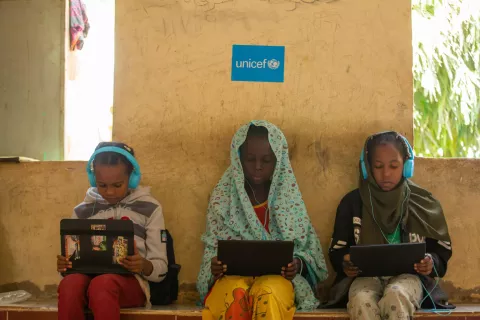Pre-pandemic data show 1 in 8 countries spends more on debt than on education, health and social protection combined – UNICEF
UNICEF is calling for the extension of debt service relief and debt restructuring so that countries – and their children – can bounce back

FLORENCE/NEW YORK, 1 April 2021 – Around 1 in 8 countries globally spends more on debt than on social services, according to a UNICEF report released today.
COVID-19 and the Looming Debt Crisis notes that 25 countries globally – the majority of them already burdened by poverty and deprivation – spent a higher proportion of total government expenditure on debt service in 2019 than they did on education, health and social protection combined. Global efforts are needed to protect social spending, and with it the right of every child to social security, education and health services, says the report.
“Children living in countries with high debt burdens and limited resources for social protection, education and health are unlikely to ever break free from poverty and deprivation,” said UNICEF Executive Director Henrietta Fore. “The personal and public costs are enormous, leaving children, their communities and their countries with little hope for sustainable economic and social development.”
Before the COVID-19 pandemic, countries with the highest levels of debt service – including Chad, The Gambia, Haiti and South Sudan – were spending at least US3 dollars on debt for every dollar going to essential social services, according to the report.
Additionally, the report notes that a quarter of low- and middle-income countries – home to 200 million children – are currently debt-distressed or at risk of debt-distress.
While the G20 nations agreed a Debt Service Suspension Initiative covering April 2020 to June 2021, only 1 in 3 eligible countries has participated. So far, the initiative has helped maintain spending on health and social protection in the 46 participating countries. However, education spending has already contracted over the past year. Indebted countries have also reportedly cut spending on child protection, nutrition and water, sanitation and hygiene services, the report says.
“The pandemic has caused a global education catastrophe that desperately needs addressing to avoid the COVID-19 generation from becoming a lost generation. Yet, due to COVID-19 and the debt burdens faced by these countries, we are already seeing a contraction in education budgets at a time when countries need to be investing in improving schools and education systems,” said Fore.
The report also notes that the global response to the debt crisis is too small in comparison to the overall fiscal response to COVID 19. The debt standstill does not currently cover debt to commercial creditors, leaving middle-income countries increasingly exposed.
A new international debt restructuring architecture – that includes greater concessional support for heavily indebted poor countries; greater transparency on debt as part of national budget processes; and coordinated action on the part of creditors – is crucial to protecting children’s rights in the wake of COVID-19.
“Comprehensive debt relief and restructuring is essential to ensure a recovery that is both inclusive and sustainable so that children do not bear the double burden of reduced social services now and increased debt in the future,” said Fore. “It is imperative that international agencies, creditors, and national governments act together to reduce the debt burden and direct savings towards inclusive social investments.”
#####
Notes to editors:
COVID-19 and the Looming Debt Crisis is the first instalment in a series of briefs to be published jointy by UNICEF Innocenti and UNICEF Programme Division called: Protecting and Transforming Social Spending for Inclusive Recoveries.
About UNICEF
UNICEF works in some of the world’s toughest places, to reach the world’s most disadvantaged children. Across more than 190 countries and territories, we work for every child, everywhere, to build a better world for everyone.
Follow UNICEF on Twitter, Facebook, Instagram and YouTube
About UNICEF Innocenti
The Office of Research – Innocenti is UNICEF’s dedicated research centre. It undertakes research on emerging or current issues in order to inform the strategic directions, policies and programmes of UNICEF and its partners, shape global debates on child rights and development, and inform the global research and policy agenda for all children, and particularly for the most vulnerable. Please visit: www.unicef-irc.org



